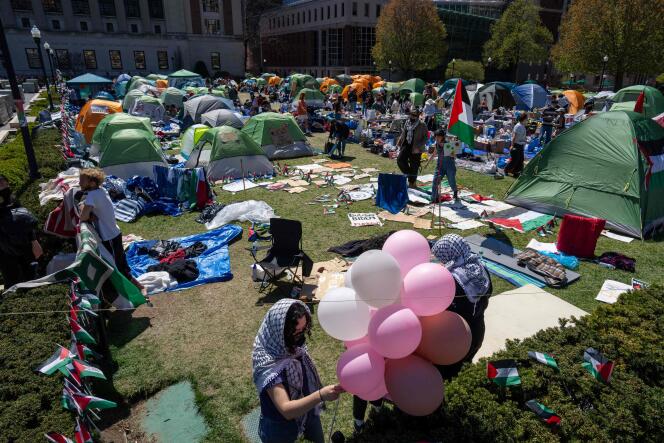


Milène Klein was about to celebrate Jewish Passover with her family on Monday, April 22. But that didn't stop her from continuing to protest. A Palestinian flag drawn on her left cheek, the word "Jewish" written on the right one, this 21-year-old philosophy and comparative literature student was one of many Jewish students at Columbia University supporting the movement against the war in Gaza. The New York campus, which has a large Jewish student community (5,000 out of 36,000), has been torn apart for months over the war between Israel and Hamas. Tensions became so rancorous that the site was transformed into an entrenched camp, with students being screened by the police and classes suspended in a hurry on Monday morning, before pro-Palestinian students were arrested in the evening.
"It's as if there's been a military coup on campus. We don't see our leaders anymore; they send us emails to tell us that what's happening is terrible. There are cops all over campus. But a lot of students feel that now it's our campus," confided Klein, who felt she needed to seize the chance to make her voice heard. "It's our responsibility as Jews to stand up and say that what's happening [in Gaza] is genocide," she believed, accusing "Zionists of using this moment to push their agenda and threaten Palestinian and Arab students on campus."
But, at the heart of these tensions, Jewish students also feel they are in danger. They have been verbally assaulted, sometimes physically threatened and hear anti-Israeli, even anti-Semitic, slogans when they are in their dorms located next to the central campus square. The matter then took a political turn, with a campus and faculty committed to the left, a generally worried Jewish community and Republicans delighted to take on progressive universities and muzzle any criticism of Israel.
President Joe Biden himself spoke out on the subject on Monday, condemning "anti-Semitic protests" on campus, as well as "those who don't understand what's going on with the Palestinians." At Yale, some 60 students defending the Palestinian cause have been arrested. Across the country, other campuses have mobilized.
The crisis at Columbia crystallized last Wednesday, when the university's president, 61-year-old Nemat Shafik, an Egyptian-born economist in charge since the summer of 2023, was being heard by a congressional committee, the same one that led to the downfall of the presidents of Harvard and the University of Pennsylvania in December 2023. Asked by Trump-supporting congresswoman Elise Stefanik whether calling for the genocide of Jews violated their university's internal rules, they had replied that it "depended on the context." Shafik was determined not to make the same mistake. "Yes, it does," she succinctly replied when asked the same question on Wednesday.
You have 64.33% of this article left to read. The rest is for subscribers only.
